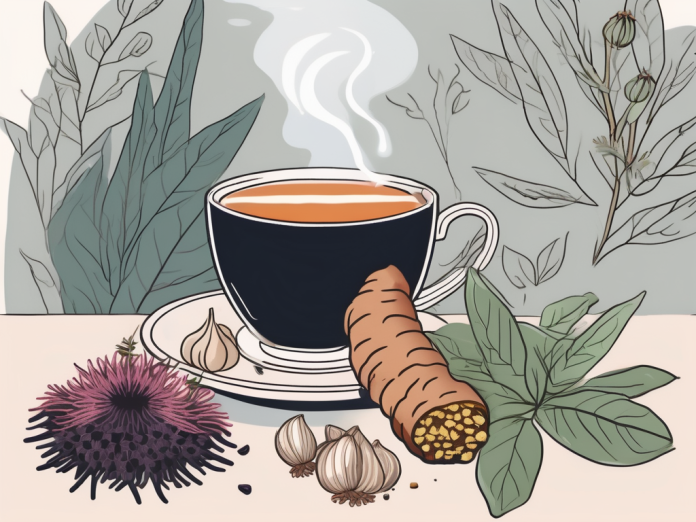Welcome to our guide on effective herbal remedies for cold and flu symptoms. When it comes to treating these common ailments, many people turn to natural remedies for relief. In this article, we will explore the different symptoms of cold and flu, the power of herbal medicine, the top herbal remedies, how to prepare herbal remedies at home, and important safety precautions to keep in mind. So let’s dive in and discover the wonderful world of herbal remedies!
Understanding Cold and Flu Symptoms
Before we delve into the world of herbal remedies, it’s important to understand the symptoms of cold and flu. Both conditions are respiratory illnesses caused by viruses, but they have some distinct differences.
Cold and flu symptoms can sometimes overlap, making it crucial to differentiate between the two. While both may start with a sore throat and congestion, the flu tends to come on more suddenly and severely than a cold. Understanding these differences can help you seek appropriate treatment and care.
The Common Cold: What You Need to Know
The common cold is characterized by symptoms such as a runny or stuffy nose, sneezing, sore throat, and mild fatigue. It usually lasts for about a week and can be caused by various viruses. While it may not be a serious illness, it can certainly make you feel miserable.
One interesting fact about the common cold is that there are over 200 different viruses that can cause it, with rhinoviruses being the most common culprits. This diversity in viral strains is why it’s challenging to develop a universal cure for the common cold.
Influenza: A Deeper Dive
Influenza, commonly known as the flu, is a more severe respiratory illness caused by the influenza virus. Flu symptoms often include high fever, body aches, fatigue, cough, and a headache. In some cases, it can lead to complications, especially in vulnerable populations such as the elderly and young children.
One key difference between the flu and the common cold is the rapid onset of symptoms with the flu. You may feel fine in the morning and then suddenly develop a high fever and body aches by the afternoon. This abrupt change in health status is a hallmark of influenza and can help differentiate it from a regular cold.
The Power of Herbal Remedies
For centuries, herbal medicine has been used to treat various ailments, including cold and flu symptoms. The use of plants and herbs as medicine dates back thousands of years and is still widely practiced today. Let’s explore the history of herbal medicine and how these remedies work.
The History of Herbal Medicine
The use of herbs for medicinal purposes can be traced back to ancient civilizations such as the Egyptians, Greeks, and Chinese. These cultures recognized the healing properties of plants and developed sophisticated systems of herbal medicine.
How Herbal Remedies Work
Herbal remedies work by harnessing the therapeutic compounds found in plants. These compounds can have antiviral, antibacterial, and immune-boosting properties. When consumed or applied externally, they help alleviate the symptoms of cold and flu and support the body’s natural healing processes.
Top Herbal Remedies for Cold and Flu
Now that we understand the power of herbal medicine, let’s explore some of the top herbal remedies for cold and flu symptoms. These remedies have been used for centuries and are known for their effectiveness in relieving discomfort and speeding up recovery.
Echinacea: Nature’s Cold Fighter
Echinacea is a popular herb known for its immune-boosting properties. It helps strengthen the immune system, making it more resistant to viruses. Research suggests that Echinacea may help reduce the duration and severity of cold symptoms.
Elderberry: The Flu Buster
Elderberry is another fantastic herbal remedy for flu symptoms. It contains compounds that inhibit the replication of viruses, making it an effective antiviral agent. Elderberry syrup or tea can help reduce the severity and duration of flu symptoms.
Ginger: The Warming Remedy
Ginger is a warming herb that can help soothe sore throats and ease congestion. It has antiviral and anti-inflammatory properties that can provide relief from cold and flu symptoms. Ginger tea or ginger-infused meals can help alleviate discomfort.
Preparing Your Herbal Remedies
Now that you know about these powerful herbal remedies, let’s explore how you can prepare them at home. Making your own herbal teas, tinctures, and infusions is easy and ensures that you have control over the ingredients.
Making Herbal Teas
To make a simple herbal tea, steep your chosen herb in hot water for about 10 minutes. You can experiment with different combinations of herbs to create a blend that suits your taste and addresses your specific symptoms. Remember to strain the herbs before drinking.
Creating Herbal Tinctures
Herbal tinctures are concentrated extracts that preserve the medicinal properties of herbs. To make a tincture, soak the herb in alcohol or apple cider vinegar for several weeks. The resulting liquid can be taken orally by adding a few drops to water or tea.
Herbal Infusions for Cold and Flu
If you prefer a more potent remedy, herbal infusions are an excellent option. Infusions involve steeping herbs in hot water for an extended period, allowing the water to extract the medicinal compounds. You can then drink the infusion or use it as a gargle for sore throats.
Safety and Precautions When Using Herbal Remedies
While herbal remedies are generally safe, it’s essential to exercise caution and be aware of any potential side effects or interactions with other medications. Here are some important safety guidelines to keep in mind:
Possible Side Effects of Herbal Remedies
Although rare, some herbs may cause allergic reactions or have mild side effects such as digestive upset or skin irritation. It’s always a good idea to start with small doses and monitor your body’s response. If you experience any adverse reactions, discontinue use and consult a healthcare professional.
Interactions with Other Medications
Herbal remedies, like any other medication, can interact with certain drugs. If you are taking any prescription medications, it’s crucial to speak to your healthcare provider or a qualified herbalist before starting any herbal treatment. They can advise you on potential interactions and ensure your safety.
When to Consult a Healthcare Professional
While herbal remedies can be highly effective, there are situations where professional medical advice is necessary. If your symptoms worsen, persist for an extended period, or if you have a pre-existing health condition, it’s important to consult a healthcare professional. They can provide a proper diagnosis and guide you on the best course of treatment.
With this comprehensive guide, you now have a solid understanding of effective herbal remedies for cold and flu symptoms. Remember to choose the remedies that suit your needs, prepare them correctly, and always prioritize your safety. By embracing the power of herbal medicine, you can find relief and support your body’s natural healing processes.




























